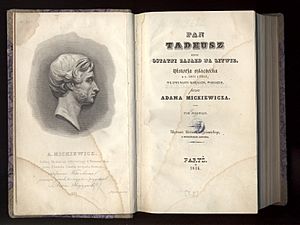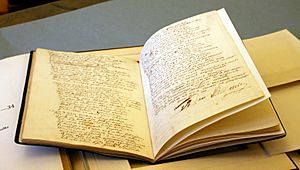Pan Tadeusz facts for kids

Title page of the first edition
|
|
| Author | Adam Mickiewicz |
|---|---|
| Original title | Pan Tadeusz, czyli ostatni zajazd na Litwie. Historia szlachecka z roku 1811 i 1812 we dwunastu księgach wierszem |
| Translator | Maude Ashurst Biggs, Watson Kirkconnell, George Rapall Noyes, Kenneth R. Mackenzie, Marcel Weyland, Bill Johnston |
| Country | France |
| Language | Polish |
| Genre | Epic poem |
| Set in | Russian Partition, 1811–12 |
| Publisher | Aleksander Jełowicki |
|
Publication date
|
28 June 1834 |
|
Published in English
|
1885 |
| 891.8516 | |
| LC Class | PG7158.M5 P312 |
|
Original text
|
Pan Tadeusz, czyli ostatni zajazd na Litwie. Historia szlachecka z roku 1811 i 1812 we dwunastu księgach wierszem at Script error: The function "name_from_code" does not exist. Wikisource |
| Translation | Pan Tadeusz at Wikisource |
Pan Tadeusz is a famous epic poem written by the Polish poet, writer, and philosopher Adam Mickiewicz. Its full title means Sir Thaddeus, or the Last Foray in Lithuania: A Nobility's Tale of the Years 1811–1812, in Twelve Books of Verse. A "foray" was a way for nobles in Poland to claim land rights.
The poem was first published in Paris on June 28, 1834. It is considered one of the last great epic poems in European literature.
Pan Tadeusz is Poland's national epic. It is required reading in Polish schools. The poem has been translated into 33 languages. A film version, directed by Andrzej Wajda, was released in 1999. In 2014, Pan Tadeusz was added to Poland's list in the UNESCO Memory of the World Programme, which recognizes important historical documents.
Contents
What is Pan Tadeusz About?

The story of Pan Tadeusz happens over seven days. It takes place in 1811 and 1812. This was a time when Poland had been divided by Russia, Prussia, and Austria. Poland was not on the map as an independent country. However, a small Polish state called the Duchy of Warsaw existed for a short time.
The story is set in the village of Soplicowo, in a part of Poland controlled by Russia. This is where the Soplica family lives. The poem tells the story of two noble families who have been fighting for a long time. It also tells about the love between Tadeusz Soplica from one family and Zosia from the other. There is also a side story about local people rising up against the Russian soldiers. Mickiewicz wrote openly about the occupation because he was living in Paris, away from Russian control.
The poem starts with "O Lithuania." This is because in the 1800s, "Lithuania" referred to a historical region. It was part of the old Polish–Lithuanian Commonwealth, not just the modern country of Lithuania.
Mickiewicz was inspired by an old Polish cookbook. He used it to describe a grand, old Polish feast in the poem. He included names of real dishes like "royal borscht."
The Story of Pan Tadeusz
Tadeusz Returns Home
A young Polish noble named Tadeusz Soplica comes back home. He has been studying in Vilnius. His family estate is called Soplicowo. Tadeusz is an orphan. His uncle, Judge Soplica, raised him. The Judge is the younger brother of Tadeusz's father, Jacek Soplica.
Tadeusz is greeted by Wojski, a family friend. Wojski tells him about a legal case. The Judge and Count Horeszko are fighting over who owns a castle. The castle used to belong to Pantler Horeszko, a relative of the Count. The Pantler was killed many years ago. The case is being handled by the Chamberlain, a friend of the Judge. Tadeusz also meets Zosia, a young girl who lives with the Judge. She is the Pantler's granddaughter. Telimena, the Judge's cousin, is Zosia's caretaker. Tadeusz is interested in Zosia, but he also flirts with Telimena.
The Old Feud
Meanwhile, Count Horeszko visits the castle. He meets Gerwazy, the castle warden. Gerwazy was an old servant of the late Pantler. The Count tells Gerwazy he doesn't care much about the castle. He plans to drop the lawsuit.
Gerwazy then tells the Count about the long-standing fight between the Soplica and Horeszko families. The Pantler used to invite Jacek Soplica, Tadeusz's father, to the castle often. Jacek was popular among the local nobles. Jacek wanted to marry the Pantler's daughter. But the Pantler refused him. Later, during an uprising, Russian troops attacked the castle. Jacek suddenly appeared and shot the Pantler. Gerwazy swore to get revenge for his master. But Jacek disappeared. This story makes the Count excited about the conflict. He decides he must take the castle back from the Judge.
The Bear Hunt and a New Fight
News spreads that a bear has been seen in a nearby forest. A big hunt is organized. Tadeusz, Wojski, the Count, and Gerwazy all take part. The bear attacks Tadeusz and the Count. They are saved by Father Robak, a monk. He appears suddenly, grabs Gerwazy's gun, and shoots the bear.
After the hunt, the Judge decides to have a feast. His servant, Protazy, suggests holding it in the castle. This would show everyone that the Judge is the rightful owner. During the feast, an argument starts. Gerwazy accuses the Judge of trespassing. Protazy accuses Gerwazy of the same. The Count defends Gerwazy and claims the castle. A fight breaks out. Tadeusz stops it by challenging the Count to a duel the next day. The Count leaves angrily. He tells Gerwazy to gather support from other nobles to fight the Soplicas.
Father Robak's Plan
Father Robak meets with the Judge. He scolds him for the fight at the castle. He reminds the Judge that his brother, Jacek, wanted peace with the Horeszkos. This was to make up for killing the Pantler. Jacek had arranged for Zosia to be raised by the Soplicas. He wanted her to marry Tadeusz. This marriage would bring the two families together.
Father Robak also talks about Napoleon's armies. He says they will soon arrive in Lithuania. He urges Poles to unite and fight the Russians, not each other. The Judge is eager to fight the Russians. But he says the Count, being younger, should apologize first.
The Nobles Gather
Poor nobles gather at Gerwazy's call. They argue about starting an uprising against the Russian forces. They also discuss news about Napoleon's army, which they heard from Father Robak. Gerwazy convinces them that the Soplicas are the main enemy.
The Count soon arrives at the Soplicas' manor. He takes the family hostage with his new supporters. However, the next day, Russian troops intervene. They arrest the Count's followers, including Gerwazy. The Russian commander is Major Płut, who is actually Polish. The second in command is Captain Ryków, a Russian who sympathizes with the Poles.
The Judge tries to convince Major Płut that it's just a neighborly quarrel. He says he won't complain against the Count. But Płut sees the Count's supporters as rebels. The Judge reluctantly lets the Russians stay at his house. Meanwhile, Robak frees the arrested nobles. A fight breaks out when Major Płut makes advances on Telimena. Tadeusz punches him to defend her. During the battle, Father Robak saves the Count's and Gerwazy's lives. He gets seriously wounded. Captain Ryków eventually surrenders after the Poles cause heavy losses. Major Płut disappears.
A Secret Revealed
After the battle, the Judge tries to bribe Ryków to keep the incident quiet. Ryków refuses the money. But he promises the whole thing will be blamed on Major Płut. Gerwazy then confesses he killed Płut to keep him silent.
Father Robak predicts he will die soon from his wounds. He asks to speak alone with Gerwazy and his brother, the Judge. He reveals that he is actually Jacek Soplica. He tells his side of the Pantler's death. Jacek and the Pantler's daughter were in love. The Pantler knew this. But he thought Jacek was not noble enough to marry his daughter. So, he pretended not to notice. The Pantler treated Jacek as a friend for political reasons. He needed Jacek's influence among the lesser nobles.
Jacek suffered through this pretense. Then, the Pantler openly asked Jacek for his opinion about another man marrying his daughter. Jacek left without a word. He planned never to visit the castle again. Much later, he saw the castle being attacked by Russians. Seeing the Pantler victorious made Jacek feel overwhelmed with sadness and anger. This drove him to kill the Pantler.
Gerwazy admits that the Pantler had wronged Jacek. He gives up his desire for revenge. He feels they are even because Jacek (as Father Robak) saved him and the Count. Gerwazy also reveals that the dying Pantler gave a sign that he forgave his killer. Father Robak dies the next night.
A Happy Ending
The nobles who fought against the Russians, including Tadeusz and the Count, have to leave the country. They are in danger of being arrested by Russian authorities. A year later, they return as soldiers in the Polish troops fighting with Napoleon's army. Gerwazy and Protazy are now friends. They remember the events from a year before. Tadeusz and Zosia get engaged, bringing the two families together at last.
Other Translations
Pan Tadeusz has been translated into English many times:
- 1885: Maude Ashurst Biggs, called "Master Thaddeus"
- 1917: George Rapall Noyes, a prose translation
- 1962: Watson Kirkconnell, called "Sir Thaddeus"
- 1986: Kenneth R. Mackenzie
- 2005: Marcel Weyland, a translation that keeps the original rhythm
- 2018: Bill Johnston, who won an award for his translation
The first translation of Pan Tadeusz was into Belarusian. It was done by Vintsent Dunin-Martsinkyevich in 1859. However, the Russian authorities only allowed the first two chapters to be published.
Film Versions
The first film version of the poem was made in 1928. The film made by Andrzej Wajda in 1999 was a big success in Poland.
Popularity
In 2012, the President of Poland, Bronisław Komorowski, started the National Reading Day. Pan Tadeusz was read in many places across the country. This helped to encourage reading and make Polish literature more popular. On June 28, 2019, Google's Doodle in Poland, Lithuania, Belarus, Iceland, Ireland, and the UK celebrated the poem.
Images for kids
-
Illustration to Book III of Pan Tadeusz by Adam Mickiewicz. Picking Mushrooms, painting by Franciszek Kostrzewski, around 1860.
See also
 In Spanish: Pan Tadeusz para niños
In Spanish: Pan Tadeusz para niños
 | William Lucy |
 | Charles Hayes |
 | Cleveland Robinson |





